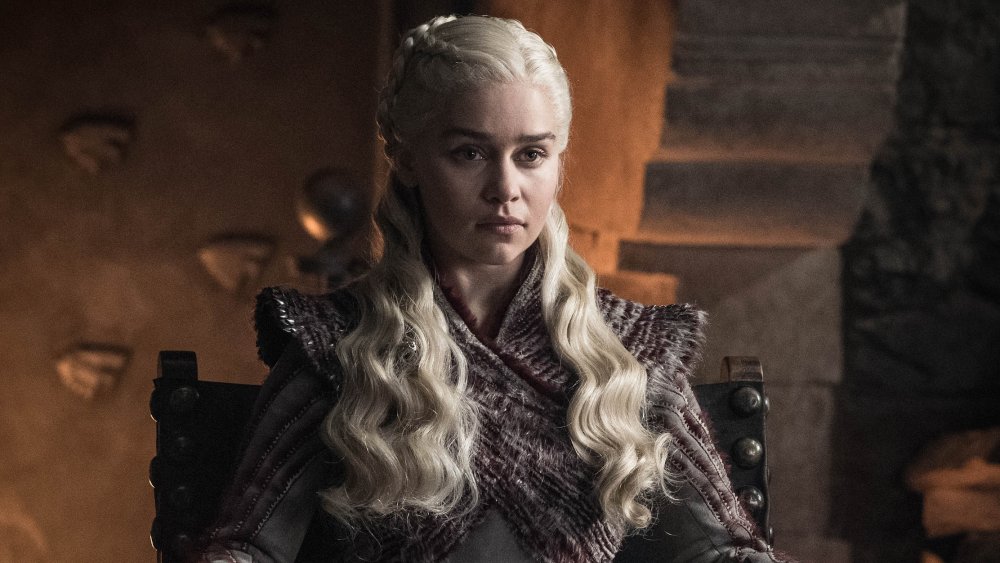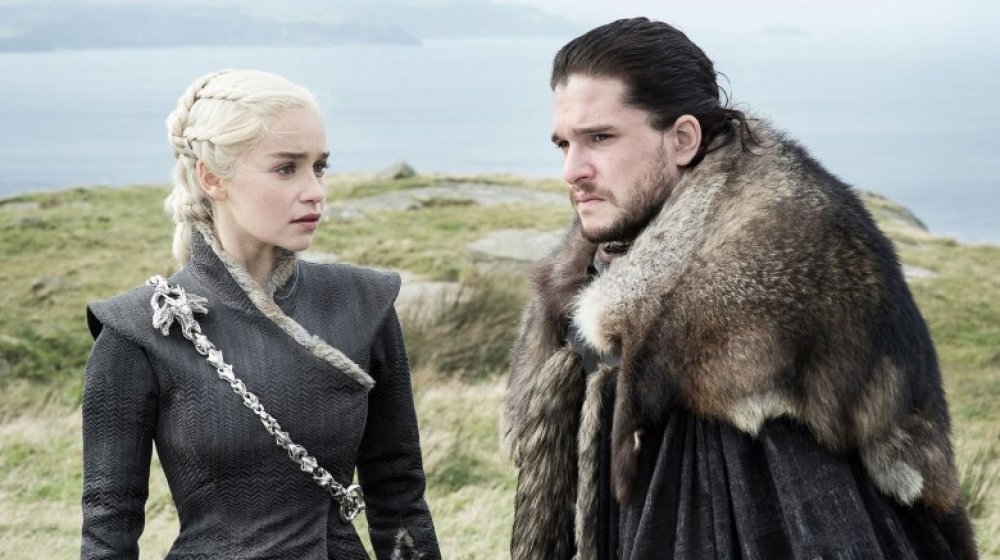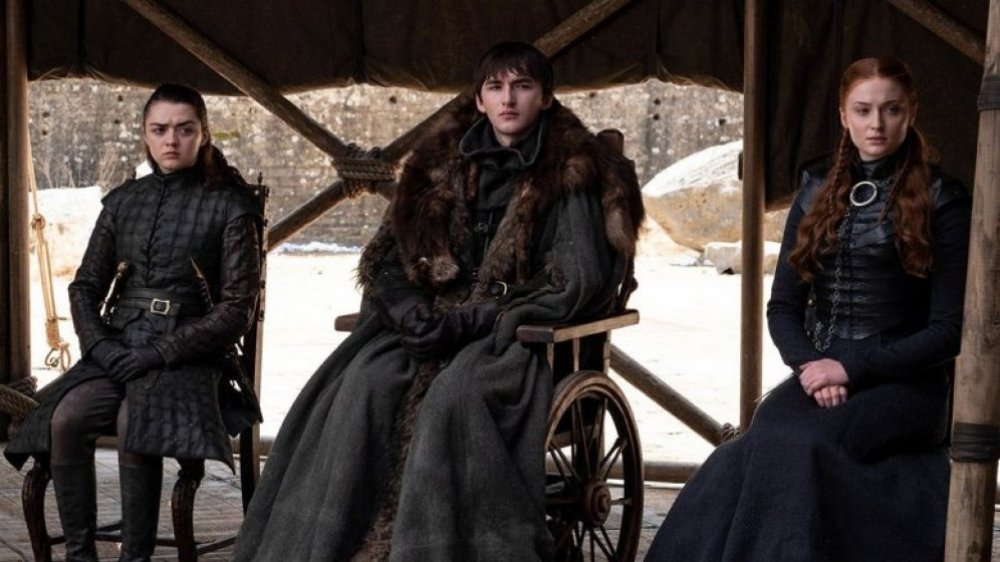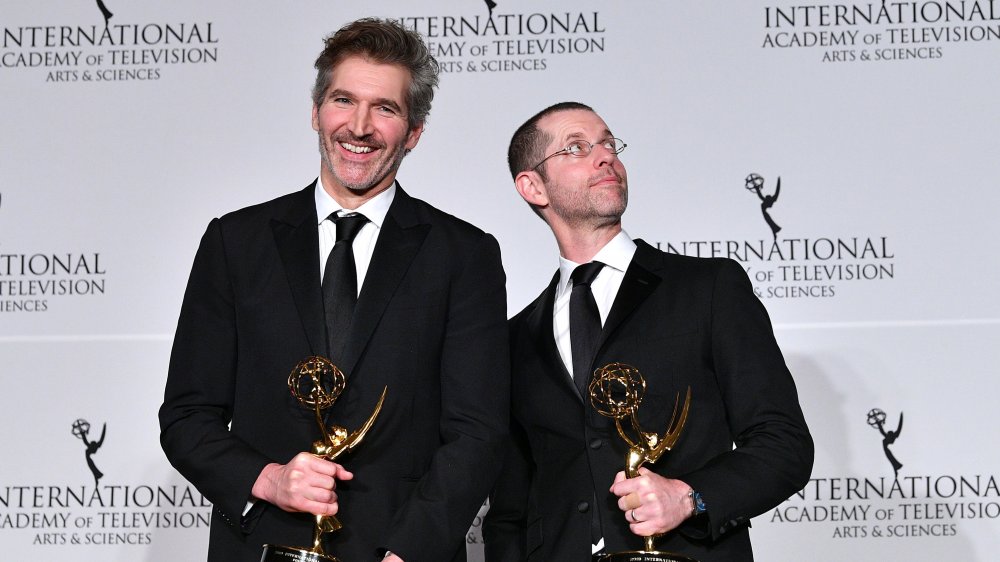The Real Reason Game Of Thrones Ended After Season 8
After nearly a decade on television, HBO's Game of Thrones – based on the Song of Ice and Fire series written by George R.R. Martin — came to an end with just 13 episodes split between its seventh and eighth seasons. Fans were dying to know how the show would end after witnessing years of intrigue, plotting, backstabbing, larger-than-life battles, and political drama. When all was said and done, who would claim the Iron Throne of Westeros and its Seven Kingdoms?
Ultimately, fans were bitterly disappointed when Game of Thrones ended not with a bang but with an enormous whimper. In its final six episodes, the series, overseen by showrunners David Benioff and D.B. Weiss, seemed to rush its pace at an absurd, breakneck speed and backtrack on some of its best character arcs and plotlines in an apparent race to the finish line — leaving loyal viewers deeply distressed over how their favorite show came to an end.
Whether you were totally let down with the finale of Game of Thrones or you somehow liked its anticlimactic finish, you're probably wondering why the show decided to end after eight seasons in the first place. From Benioff and Weiss' future projects to the entire show's narrative arc, here's the real reason that Game of Thrones came to a close when it did.
David Benioff and D.B. Weiss had an ending for Game of Thrones in mind for a long time
As mentioned, Game of Thrones' ending proved a disappointment to the majority of people — and some fans believe that was due in large part to the fact that Benioff and Weiss wanted to end the show with some expediency.
In a June 2016 interview with Deadline after Game of Thrones' explosive season 6 finale, Benioff and Weiss admitted they were working towards the end of the show.
"We want to leave while all the people watching this show are really into it," Weiss shared at the time. "Get out at a high point and not have it be, 'Well, thank God that's over.'"
Added Benioff, "It's two more seasons we're talking about. From pretty close to the beginning, we talked about doing this in 70-75 hours, and that's what we'll end up with. Call it 73 for now. What Dan says is really true, but it's not just trying not to outstay your welcome. We're trying to tell one cohesive story with a beginning, middle and end. [...] The thing that has excited us from the beginning, back to the way we pitched it to HBO is, it's not supposed to be an ongoing show, where every season it's trying to figure out new story lines. We wanted it to be one giant story, without padding it out to add an extra 10 hours, or because people are still watching it. We wanted something where, if people watched it end to end, it would make sense as one continuous story. We're definitely heading into the end game now."
Years later, just before the series finale aired, the duo repeated the same line to Entertainment Weekly, saying, "HBO would have been happy for the show to keep going, to have more episodes in the final season. We always believed it was about 73 hours, and it will be roughly that. As much as they wanted more, they understood that this is where the story ends."
What exactly went wrong with Game of Thrones in its final season?
Ultimately, it's not hard to understand the pain many fans felt when the series' credits rolled for the very last time. After years of careful plotting and rich characterization, storylines that seemed like they would crossover with others (or at least amount to something in the end), and more intriguing fan theories that could have come true than the ones that actually did, Game of Thrones wrapped up so quickly and hastily that it was hard to believe it was over. Heck, even Thrones actors themselves expressed disappointment over the series finale.
Mysterious forces like the Night King, an undead, ancient ice zombie who seemed unbeatable and untouchable for the entire series, were disposed of in moments — while characters like Jaime Lannister (Nikolaj Coster-Waldau) turned their backs on years of character development to return to their less-desirable roots. Inevitable conclusions, like Daenerys Targaryen's (Emilia Clarke) descent into madness, happened in the blink of an eye. Important characters like Tyrion Lannister (Peter Dinklage), his sister Cersei (Lena Headey), and the actual heir to the Iron Throne, Jon Snow (Kit Harington), were basically shoved to the side. In the end, Bran Stark (Isaac Hempstead Wright) — who transitioned from a highborn Northern boy to an all-knowing omniscient being known as the Three-Eyed Raven — took control of the Seven Kingdoms, in a twist that left many fans howling at their TV in confusion and anger.
As writer Ben Lindbergh put it in an essay about Thrones' finale on The Ringer, many were left puzzled by Benioff and Weiss' decisions during the final seasons: "Why, when handed a blank check and a creative license with no expiration date, would they put a higher priority on trimming the running time than presenting [any] emotional, momentous, long-in-the-making moments?" he wrote. "And why, when faced with those self-imposed constraints, would they choose to parcel out some of the screen time in such a frivolous fashion?"
Game of Thrones' showrunners were anxious to move on after season 8
As fans get more distance from Game of Thrones' incredibly rushed final season, it seems that there were several factors behind the showrunners' decision to conclude their flagship series. As Thrones approached its end, Benioff and Weiss had several future projects on their plate — including Confederate, a new project with HBO, and even their own Star Wars film, apparently intended to be the first in a trilogy.
Confederate, a series that depicts an alternate history in which the South won the Civil War, was soundly slammed long before Thrones ended. It was officially rejected in early 2020, but in the aftermath of the Game of Thrones finale, other opportunities disappeared with all of the goodwill the series had earned during its early years. Though their lucrative Netflix deal remained intact, Benioff and Weiss abandoned their Star Wars trilogy project in October 2019, just five months after Thrones concluded.
Perhaps Benioff and Weiss should have been a little more careful about what they wished for. HBO clearly would have given the showrunners plenty of time and room to finish their Game of Thrones story in a satisfying way that honored its entire run, and it seems that they rejected the offer to more quickly move on to other projects — ones that ended up amounting to absolutely nothing.
No matter how or why Game of Thrones ended, it still holds a place in many fans' hearts as one of the most epic fantasies in television history. You can stream the entire series now on HBO Max or HBO Go.



